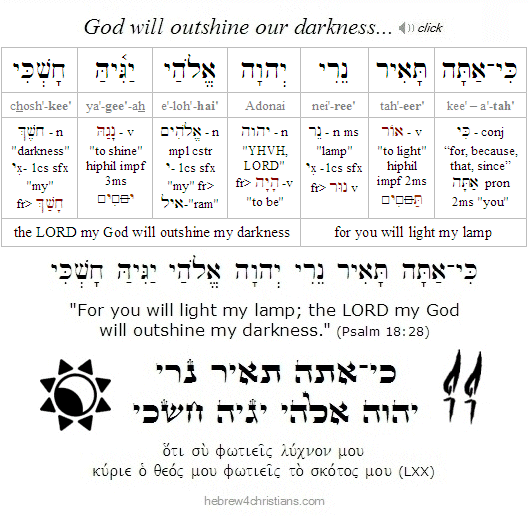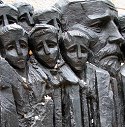|
Some people mark the date of November 9, 1938 as the start of the Jewish Holocaust. On that dreadful night - called Kristallnacht, "the Night of Broken Glass" - thousands of Germans, organized by the Nazis, destroyed over 1,000 synagogues, burned precious Torah scrolls and prayer books in town squares, ransacked and looted over 7,000 Jewish businesses, and invaded and terrorized many Jewish homes. Many Jews were killed during the attacks, and 30,000 Jewish men were arrested and taken away to the concentration camps. Kristallnacht was followed by further persecution of the Jews and is viewed by most historians as the pogram that initiated the infamous "Final Solution."
To readily identify who was a Jew to the authorities, Hitler ordered all subjugated peoples of Jewish descent to wear yellow stars of David on their clothing. Hitler relied on non-Jews to spy on and identify all those who did not comply. When the order to wear the star was issued in Holland, however, an underground newspaper made 300,000 yellow stars that said, "Jews and non-Jews stand united in their struggle," and distributed them to the public to express their solidarity with the plight of the Jewish people. In Denmark, too, the "yellow star law" was rebuffed, and King Christian X was reported to have said that if the law were to be enforced by the Nazis, he pledged to wear one himself, as would all the other people of Denmark. Later, the Danish resistance movement (with the help of ordinary Danish citizens) opposed the Nazis by safely evacuating the Jews to nearby neutral Sweden.
By far the largest act of civil resistance against Hitler and the Nazis occurred during the Warsaw Ghetto Uprising, which took place in Poland on the eve of Passover, April 19, 1943. Unfortunately most Jews were unable to defend themselves because oppressive gun control laws had disarmed the population; nevertheless, it still took the Nazi war machine nearly a month to vanquish the ghetto - longer than it took for Hitler to overcome the entire country of Poland. Because the Warsaw Ghetto Uprising symbolized Jewish resistance against the Nazis, in 1953, after the State of Israel was formed, it was proposed to observe Yom HaShoah on the anniversary of the uprising -- on the 14th of Nisan -- but this date was rejected because it marked the start of Passover. After considerable debate, the memorial was postponed until after the Passover holiday week was over, on the 27th of Nisan, eight days before Yom Ha'atzma'ut, or Israeli Independence Day.
While there is no official "haggadah" for the Yom HaShoah memorial, it is traditional to light a yellow yahrzeit candle for those who died, to attend a Yom HaShoah memorial service, and to recite kaddish. Some people prepare a lavish meal using recipes written from memory by the starving women of Theresienstadt (salvaged after the war). Many of these recipes are for rich desserts and cakes, recalling days of joy before the women and their families were rounded up and brought to the concentration camps. During the memorial meal, stories of Jews who died are told, as well of those of survivors. Many survivors tell stories about the "hidden children" who were saved by righteous Gentiles (ūŚų▓ūĪų┤ūÖūōųĄūÖ ūÉūĢų╝ū×ūĢų╣ū¬ ūöųĖūóūĢų╣ū£ųĖūØ). These young survivors were either hidden in secret places (like Anne Frank) or were "adopted" by Christian families who pretended they were their own children.
What does the Holocaust mean to you? How do you do "theology after Auschwitz?" Does the Shoah rouse you to be vigilant against the rise of political evil in the world? Does its warn you how about how easy it is for you to "tune out" - to close your eyes, ears, and nose to the presence of evil and the practice of social injustice and crimes against humanity? As Elie Wiesel said, "Indifference to evil is evil." Hitler not only murdered millions of Jews (including over a million Jewish children), but he also murdered millions of non-Jews whom he regarded as a threat to his political ideology and to "homeland security." We must never forget the horrors of Holocaust because it could happen again - and to believe otherwise is to forget the radical evil lurking within human nature. Germany was perhaps the greatest nation of Europe, cultured, brilliant, "Christian," enlightened, with a rich history of intellectual and artistic genius -- and yet it nevertheless practiced unspeakable barbarity and tolerated massive and heartless genocide against the Jewish people...
ū¦ūĢų╝ū×ų┤ūÖ ū©ūĀų╝ų┤ūÖ ūæųĘū£ų╝ųĘūÖų░ū£ųĖūö ū£ų░ū©ūÉū®ūü ūÉųĘū®ūüų░ū×ų╗ū©ūĢų╣ū¬
ū®ūüų┤ūżų░ūøų┤ūÖ ūøųĘū×ų╝ųĘūÖų┤ūØ ū£ų┤ūæų╝ųĄūÜų░ ūĀūøųĘūŚ ūżų╝ų░ūĀųĄūÖ ūÉų▓ūōūĀųĖūÖ
ū®ūéų░ūÉų┤ūÖ ūÉųĄū£ųĖūÖūĢ ūøų╝ųĘūżų╝ųĘūÖų┤ūÜų░ ūóųĘū£ųŠūĀųČūżųČū®ūü ūóūĢų╣ū£ųĖū£ųĘūÖų┤ūÜų░
koo┬Ęmee ┬Ę roh┬Ęnee ┬Ę va┬Ęlai'┬Ęlah ┬Ę le┬Ęrosh ┬Ę a┬Ęshe┬Ęmoo┬Ęroht
sheef┬Ękhee ┬Ę kha┬Ęma'┬Ęyeem ┬Ę lee┬Ębekh ┬Ę no┬Ękhach ┬Ę pe┬Ęnei ┬Ę a┬Ędo┬Ęnai
se┬Ęee ┬Ę e┬Ęlav ┬Ę ka┬Ępa'┬Ęyeekh ┬Ę al ┬Ę ne'┬Ęfesh ┬Ę o┬Ęla┬Ęlai'┬Ęyeekh

"Arise, cry out in the night, at the beginning of the night watches!
Pour out your heart like water before the face of the LORD!
Lift your hands to him for the lives of your children."
(Lam. 2:19)

"I believe. I believe in the sun even when it is not shining; I believe in love even when feeling it not; and I believe in God, even when God is silent" (from an anonymous poem found on the wall of a cellar in Cologne, Germany, where some Jews hid from the Nazis).
"The opposite of love is not hate, it's indifference. The opposite of art is not ugliness, it's indifference. The opposite of faith is not heresy, it's indifference. And the opposite of life is not death, it's indifference." - Elie Weisel
Though we can't control what happens in this dangerous world, we can trust that God is working all things together for good, even during times of severe testing, and even in things that are blatantly evil (Rom. 8:28; Gen. 50:20). And while we instinctively recoil at the prospect of physical death, there are decidedly things worse than death itself, namely, losing hope in life, walking in the darkness of despair, living a joyless existence because of fear. As much as we abhor evil - and we must resist it with all our hearts - even more must we love the good - and cling to God (ūĢų╝ū£ų░ūōųĖūæų░ū¦ųĖūöųŠūæūĢų╣) with all that is within us.
"There may be times when we are powerless to prevent injustice, but there must never be a time when we fail to protest." - Elie Wiesel
"You may know that the last few nights have been bad... Those who had been bombed out came to me the next morning for a bit of comfort. But I am afraid I am bad at comforting; I can listen all right, but I can hardly find anything to say. But it seems to me more important to share someone's distress than to offer smooth words about it... I've no sympathy with some wrong-headed attempts to explain away distress, because instead of being comfort, they are the exact opposite. So I don't try to explain it, and I think that is the right way to begin, though it's only a beginning, and I very seldom get beyond it. I sometimes think that real comfort must break in just as unexpectedly as the distress." - Dietrich Bonhoeffer (martyred April 9, 1945, at the Flossenb├╝rg concentration camp)
Ultimately, the most important thing to remember regarding death is the truth about God's salvation (ūÖų░ū®ūüūĢų╝ūóųĖūö). After all, God assuredly hates death and provides each of us with its eternal remedy: By clothing himself in human flesh, Yeshua embraced mortality itself and willingly bore the penalty for your sins, exchanging his life for yours, thereby destroying the one who had the power of death, namely the devil, and by so doing, set you free from slavery to the dread of death (Heb. 2:14-15). To those who belong to belong to Messiah, death represents a passage to eternal life and the loving presence of God Himself.
Only the miracle of faith can see hope in the face of radical evil... and yet that is the very message of the cross of the Messiah... Our Lord demonstrated that He is the the Killer of death itself; the Slayer of the Serpent; and the ultimate Triumph of God's Light over the realm of despair and everlasting darkness... He is the First and the Last, the Living One who died, and behold is alive forevermore, the true Keyholder of Death and Hell (Rev. 1:18).
Hebrew Lesson:
 |
|



